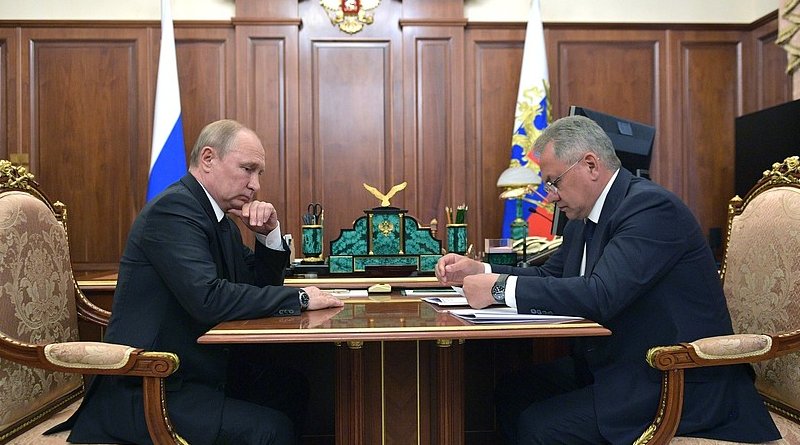Russia May Revive Astana Talks Amid Virus Distraction – OpEd
By Arab News
By Dr. Dania Koleilat Khatib*
Russian Defense Minister Sergei Shoigu last week met with Syrian President Bashar Assad to discuss the cease-fire in Idlib. While the West is scrambling to manage the coronavirus pandemic and Syria is not on its radar, Russia might find an opportunity to revive the stalled Astana talks — the parallel course to the Geneva process — and to impose new realities on the ground that can dictate the future of Syria.
The Syrian issue still represents a danger for Europe in the years to come, as the Assad regime threatens to create several new waves of refugees from the areas it recaptures. However, the current measures the EU has taken to close its external borders to non-EU citizens in the short to medium term will likely minimize, if not remove, the pressure of waves of Syrian refugees arriving on European shores. This makes Syria less important an issue, at least for the moment. In this period, when the old continent is consumed by the instinct of self-preservation, Assad’s human rights abuses can go unnoticed.
The residents of Idlib include many people who rejected the “reconciliations” or, more properly, the capitulations dictated by Assad and enforced by the Russians in other parts of the country. They preferred to get on the green buses and take refuge in Idlib, away from Assad’s brutality. They have witnessed multiple displacements and fled their worst nightmare, which is to be placed under the rule of Assad. They are unlikely to accept any reconciliation with the regime.
Some of those who accepted the reconciliation in Daraa Al-Balad in the country’s southwest returned to protest early this year after one young man was found dead after being kidnapped by the political security services. The city was recaptured by the regime in 2018, but Assad did not keep the promises he made to residents despite Russian guarantees. The Syrian regime has failed to pacify the areas it has recaptured for many reasons, including the brutality and revenge mentality with which it governs, and its failure to provide basic services to residents.
Though Russia is a major player, it failed to coerce the international community into accepting its conditions; the main one being reconstruction in the absence of a proper political transition that would remove Assad from power. It launched the Astana talks in an attempt to compete with the Geneva process in deciding the future of Syria. However, the negotiations held in Kazakhstan were stillborn. Though the three participating countries — Iran, Russia and Turkey — agreed on the territorial integrity of Syria, arguably for different reasons, they have irreconcilable disagreements, particularly regarding the fate of Assad.
Coronavirus has given Assad the perfect opportunity. He started to accelerate his attempts on Idlib as news of the outbreak in Europe started emerging. Now that Europe and the US are at the center of the virus crisis, Assad can have a free hand.
The various agreements between Russia and Turkey on Idlib have generally not held. Recep Tayyip Erdogan was recently “humiliated” by Vladimir Putin, who kept him and his delegation waiting before their meeting. Meanwhile, Turkey’s latest discussions in Brussels did not result in any material help. While Erdogan does not want to turn Idlib over to the Assad regime, he does not seem to have the help he needs from NATO and Europe to push back against the regime’s offensive.
Ankara might find it a safer bet to enter into an agreement, though halfheartedly, with Russia and Iran, Assad’s sponsors. This might be a test for Turkey, which will have to choose between its affiliation with the West and its ties with Russia. There is also a concern that, the more Assad recaptures, the more violence will erupt due to his reprisal strategy. There is also the Kurds, who may be willing to enter into a deal with the regime and Russia — though this might be their last resort, as there is no trust in the regime. The Kurds know that Assad will not keep his promises. However, a deal might be their only option to fend off Turkey, especially as Erdogan hopes to relocate refugees into the zone between Tal Abyad and Ras Al-Ain, creating a demographic imbalance between Arabs and Kurds in the latter’s disfavor.
The Russians have adopted a policy of frozen conflict, meaning they favor not having any major clashes, while at the same time maintaining a situation that allows them to have a strategic position from which they can negotiate with the different parties: Israel, the Gulf, the Iranians, the Europeans, and the US. However, now that the international environment allows, Russia may be encouraged to take a step further and seek to bridge the differences between the three lead actors in the Syrian conflict. If it succeeds in doing so, it will have a much better bargaining position with the West and will have the final word in deciding on the future of Syria.
- Dr. Dania Koleilat Khatib is a specialist in US-Arab relations with a focus on lobbying. She holds a PhD in politics from the University of Exeter and is an affiliated scholar with the Issam Fares Institute for Public Policy and International Affairs at the American University of Beirut.

